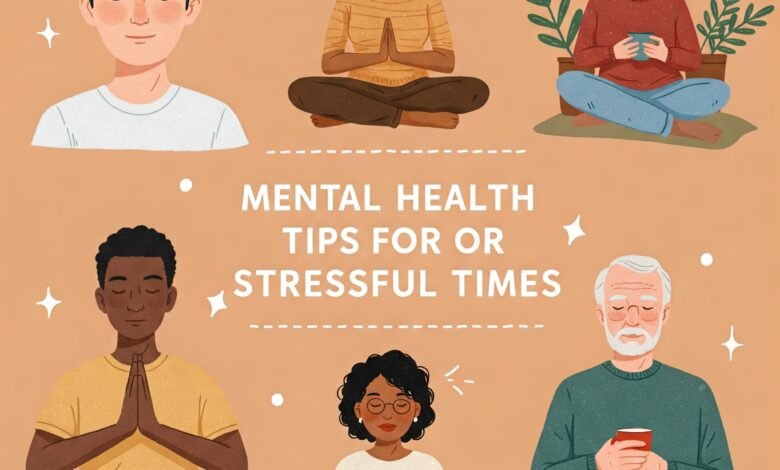Mental Health Tips for Stressful Times: Navigating Life’s Challenges

Understanding Stress and Its Impact on Mental Health
Stress is a natural response of the body to perceived challenges or threats, often referred to as stressors. It can arise from various sources, including work pressures, personal relationships, financial concerns, or illness. The physiological effects of stress involve the release of hormones such as cortisol and adrenaline, which prepare the body for a “fight or flight” reaction. These hormonal changes can result in increased heart rate, elevated blood pressure, and heightened alertness, which can be beneficial in short bursts. However, when stress becomes chronic, it can lead to a myriad of health complications, particularly relating to mental well-being.
Psychologically, stress can manifest in a variety of ways, including irritability, anxiety, and depression. Individuals may experience difficulty concentrating, disruptions in sleep patterns, or changes in appetite as signs of stress affecting their mental health. It is essential to recognize these manifestations as indicators of stress that require attention. Understanding how stress operates within our lives is crucial for managing its impact effectively.
Moreover, not all stress is inherently negative. While acute stress can motivate individuals to meet deadlines or perform under pressure, chronic stress can have detrimental effects on mental health, leading to severe conditions ranging from anxiety disorders to depression. Identifying personal stressors—those situations or events that induce stressfulness—is key to developing effective coping strategies. By acknowledging these stressors, individuals can better navigate their emotional responses, leading to improved mental health outcomes. This understanding establishes a foundation for exploring practical tips designed to mitigate stress and promote mental wellness in everyday life.
Identifying Your Stressors
Understanding the sources of stress in your life is a crucial first step toward managing it effectively. Identifying personal stressors requires self-reflection and awareness exercises that can help you uncover the factors contributing to your discomfort. One practical tool for this process is journaling. By dedicating time each day to jot down your feelings, experiences, and the situations that provoke your stress, you create a personal record that reveals patterns over time. This written account can illuminate recurring themes in your life, such as work pressures, interpersonal conflicts, or financial concerns.
In addition to journaling, mindfulness techniques can play a vital role in recognizing your stressors. Mindfulness encourages you to be present in each moment, allowing you to observe your thoughts and emotions without judgment. Engaging in mindfulness exercises, such as deep breathing or meditation, can enhance your awareness of how certain situations impact your mental health. As you practice being present, you may find it easier to identify specific triggers that elicit stress, whether they arise from external circumstances or internal thoughts.
Another effective strategy is to conduct a stress inventory, where you list all the aspects of your life that cause anxiety or unease. This comprehensive catalogue will help you gain insights into your stressors while offering a tangible reference for future reflections. By understanding the root causes of your stress, you equip yourself with the necessary information to address them head-on.
Ultimately, this self-awareness forms the foundation for developing effective coping strategies. Recognizing your unique stressors allows for tailored approaches that can make a significant difference in your mental well-being, paving the way for a healthier, more balanced life.
Developing Healthy Coping Mechanisms
In the face of life’s challenges, developing healthy coping mechanisms is essential for maintaining mental well-being. Coping strategies are various actions or thought processes that help individuals manage stress and navigate difficult situations effectively. Incorporating positive coping strategies, such as physical exercise, engaging in hobbies, and cultivating social connections, can significantly enhance one’s resilience.
Physical exercise is one of the most effective ways to cope with stress. Engaging in regular physical activity releases endorphins, which are natural mood lifters. Whether it’s a brisk walk, cycling, or attending a yoga class, the benefits of exercise extend beyond just physical health, positively impacting mental clarity and reducing feelings of anxiety. It is crucial to choose an activity that one enjoys, as this increases the likelihood of making it a consistent part of one’s routine.
Engaging in hobbies also serves as a powerful coping strategy. Whether it is painting, gardening, or playing a musical instrument, hobbies provide a distraction, allowing individuals to escape their daily stressors momentarily. These activities not only boost creativity but also instill a sense of accomplishment, enhancing overall mental well-being. It is important to explore various hobbies to find what resonates most and brings genuine joy.
Equally important is building and maintaining social connections. Interacting with friends and family offers emotional support, which is vital during stressful times. Regular conversations, whether in person or through virtual means, can alleviate feelings of isolation and promote a strong support system. The act of sharing experiences and feelings often provides perspective, effectively lessening the burden of stress.
It is also critical to strike a balance between constructive coping mechanisms and avoidance behaviors. Recognizing when one is using avoidance strategies, such as procrastination or substance use, can facilitate prompt intervention. Cultivating healthy outlets for stress will empower individuals to manage challenges more effectively, fostering a more resilient and fulfilling life.
The Importance of Routine and Structure
In times of stress and uncertainty, maintaining a daily routine can serve as a vital anchor that helps individuals navigate life’s challenges. A structured schedule provides a framework that fosters predictability in an otherwise unpredictable environment. This predictability can significantly alleviate feelings of anxiety, offering individuals a sense of control over their lives. Establishing a routine enables coherent management of daily tasks, reducing feelings of overwhelm that often accompany stressful situations.
Creating a personalized daily schedule is essential for integrating time for work, relaxation, and self-care. First, identify the most critical tasks for the day and allocate specific time slots for their completion. It is crucial to prioritize these tasks, ensuring that essential responsibilities are fulfilled without unnecessary stress. Balancing workload with relaxation time is equally important; aim to include periods of breaks throughout the day, as this can enhance overall productivity and mental well-being.
Additionally, incorporating self-care into the daily routine can further promote mental health. Activities such as mindfulness, exercise, or hobbies can provide crucial moments of joy and relaxation amidst challenging times. Allocate time slots for these self-care activities, ensuring they are treated with equal importance as work commitments. Furthermore, consistency in following a routine enhances its effectiveness, gradually instilling a sense of stability and security in one’s daily life.
In essence, the power of routine and structure should not be underestimated. By establishing a well-rounded daily schedule that includes time for essential tasks, relaxation, and self-care, individuals can regain control over their lives, ultimately reducing feelings of stress and anxiety. Embracing this approach offers a pathway toward improved mental health and resilience during turbulent times.
Mindfulness and Relaxation Techniques
In today’s fast-paced world, the practice of mindfulness has emerged as a vital tool for managing stress and promoting mental well-being. Mindfulness involves being present and fully engaged in the current moment, allowing individuals to observe their thoughts and feelings without judgment. One popular mindfulness practice is meditation, which can be easily integrated into daily routines. To get started, find a quiet space and sit comfortably. Close your eyes and focus on your breath, inhaling deeply through your nose and exhaling slowly through your mouth. Begin with just a few minutes daily, gradually extending the duration as you become more comfortable with the practice.
Another effective technique for alleviating stress is deep breathing exercises. This method helps to activate the body’s relaxation response, counteracting the effects of stress. To practice deep breathing, sit or lie down in a comfortable position. Inhale deeply through your nose, allowing your abdomen to rise as your lungs fill with air. Hold your breath for a count of four, then exhale slowly through your mouth. Repeat this process for several minutes, concentrating on the sensation of your breath to help clear your mind and dissolve tension.
Progressive muscle relaxation (PMR) is another beneficial technique that involves systematically tensing and relaxing different muscle groups in the body. Start by finding a comfortable position and taking a few deep breaths. Then, focus on your feet, tensing the muscles for five seconds before releasing the tension. Gradually work your way up through each muscle group, from your legs to your abdomen, arms, and finally your face. This practice not only aids in physical relaxation but can also promote mental clarity and emotional resilience.
Incorporating mindfulness and relaxation techniques such as meditation, deep breathing, and progressive muscle relaxation into your daily routine can lead to significant improvements in stress management and overall mental health.
Nurturing Social Connections
In times of stress, the importance of social support cannot be overstated. Strong social connections can significantly enhance mental health, providing individuals with the emotional sustenance necessary to navigate life’s challenges. Feelings of isolation can exacerbate stress, making it imperative to nurture existing relationships and build new ones. Engaging with friends, family, or support networks fosters a sense of belonging, thus alleviating anxiety and depression that may arise during difficult periods.
One effective way to strengthen these social ties is through open communication. Sharing personal experiences with trusted friends or family can create a more profound mutual understanding and enhance emotional support. It is important to remember that vulnerability can lead to a deeper connection, allowing both parties to feel seen and heard. Regularly reaching out to loved ones, whether through phone calls, messages, or face-to-face interactions, can prevent feelings of loneliness, reinforcing the support network that is vital for mental well-being.
In addition to enhancing current relationships, actively seeking out new connections can be beneficial. Joining clubs, volunteering, or participating in community events provides opportunities to meet like-minded individuals. These social environments can foster friendships based on common interests, helping individuals build a supportive framework that can endure tough times. Moreover, engaging in group activities can stimulate a sense of purpose and accomplishment, further enhancing overall mental health.
It is essential to recognize when to seek help beyond personal connections. Professional support, including therapy or support groups, can provide valuable resources and coping strategies. Surrounding oneself with a diverse network can not only improve mental resilience but also promote a culture of empathy and understanding. Encouraging open discussions about mental health within these connections can diminish the stigma associated with seeking help, creating a more supportive and compassionate community.
Setting Boundaries and Prioritizing Self-Care
In today’s fast-paced world, the importance of setting boundaries cannot be overstated. Healthy boundaries are essential for protecting mental health, as they help individuals manage their personal and professional relationships in a way that promotes well-being. By delineating what is acceptable to oneself and what is not, individuals can reduce feelings of overwhelm and reclaim their time and energy. This entails learning to say no when necessary, engaging in open communication, and recognizing one’s own limits. Establishing boundaries is not merely about denying requests from others; it also involves understanding one’s own needs and making a conscious effort to prioritize them.
Emphasizing self-care is a critical aspect of maintaining mental health. Self-care can take various forms, including physical, emotional, and social practices that promote well-being. One effective strategy is to create a self-care plan that incorporates activities that bring joy and relaxation, such as exercising, exploring hobbies, or spending time with loved ones. Mindfulness practices, such as meditation and journaling, can also foster emotional resilience, helping individuals navigate through stress more effectively.
In addition to engaging in enjoyable activities, self-care should also involve ensuring sufficient rest and maintaining a balanced diet. Sleep hygiene plays a vital role; without proper rest, mental clarity and emotional stability can suffer significantly. Furthermore, being mindful of one’s nutritional choices can enhance cognitive function and emotional well-being. By prioritizing self-care and establishing healthy boundaries, individuals can cultivate a more balanced life, ultimately enhancing their ability to cope with the challenges that arise during stressful times.
Seeking Professional Help When Needed
Recognizing the signs that indicate a need for professional mental health support can be crucial in managing stress and navigating life’s challenges effectively. If feelings of anxiety, depression, or overwhelming stress persist for an extended duration, it may be time to consider reaching out to a mental health professional. Furthermore, experiencing a noticeable decline in daily functioning, such as difficulty concentrating at work or home, can signify that assistance is required.
Other indicators include withdrawing from social interactions, a shift in eating or sleeping patterns, or experiencing physical symptoms such as unexplained aches and pains. These signs often suggest that your mental health may be suffering, and seeking help from clinicians, therapists, or counselors can provide the necessary relief and guidance. It’s vital to acknowledge that asking for help is not a sign of weakness but rather a proactive step towards better mental resilience.
There are various types of mental health resources available to suit different needs. Therapy, for example, can take many forms including cognitive-behavioral therapy (CBT), psychotherapy, or group therapy. Each method may effectively address diverse issues and provide coping strategies tailored to individual circumstances. Support groups also offer a community of individuals facing similar challenges, fostering both understanding and shared experiences which can be immensely beneficial.
Finding the right mental health support involves assessing personal needs, preferences, and comfort levels. It can be helpful to consult with a primary care physician who can provide referrals or recommend local mental health services. Likewise, online therapy options have expanded significantly, offering flexibility for those with busy schedules or those who prefer remote interactions. Ultimately, taking the initiative to seek professional help can be a critical step toward improving one’s mental health and overall well-being.
Creating a Long-Term Plan for Mental Wellness
Establishing a long-term plan for mental wellness is integral to developing resilience against stress and navigating the complexities of life. A personalized mental health plan serves as a structured approach, allowing individuals to regularly assess their emotional and psychological wellbeing. One of the first steps in creating this plan is to incorporate regular self-check-ins. These moments of reflection provide an opportunity to evaluate one’s mental state, recognize patterns in feelings and behaviors, and ultimately enable proactive responses to stressors.
During these check-ins, it is essential to identify what coping strategies are currently effective and which may require adjustments. The landscape of mental health is ever-evolving; hence, being adaptable in the selection and implementation of coping mechanisms is paramount. Individuals may find it useful to journal their experiences, maintaining a log of their emotional responses and the strategies employed to manage stress. This practice not only aids in recognizing triggers but also highlights successful approaches that can be revisited in the future.
In addition to assessing current strategies, setting long-term mental wellness goals is vital for sustaining motivation and focus. These objectives should be realistic, measurable, and tailored to one’s individual needs. Examples of long-term goals may include committing to regular exercise, cultivating mindfulness practices, or seeking professional counseling when needed. It is also beneficial to periodically review these goals to ensure they remain relevant and achievable.
By developing a comprehensive mental health plan, individuals can better navigate the challenges that arise in daily life. This proactive approach not only empowers individuals to manage stress effectively but also fosters a sense of control and agency over their mental health journey. Balancing check-ins, strategy adjustments, and goal-setting will ultimately contribute to sustained mental wellness over time.






















